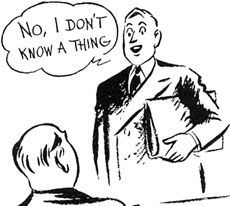 The year was 1947. Harry S. Truman was president, Chuck Yeager broke the sound barrier, and on October 17, 1947, the Manufacturers’ Agents National Association joined the community of not-for-profit trade associations.
The year was 1947. Harry S. Truman was president, Chuck Yeager broke the sound barrier, and on October 17, 1947, the Manufacturers’ Agents National Association joined the community of not-for-profit trade associations.
To celebrate our 70th MANAversary year, each Agency Sales magazine through October will include a “blast from the past” article from the early issues of The AGENT and Representative magazine, which eventually became Agency Sales.
These nostalgic looks back at how our counterparts from seven decades ago conducted their businesses and their lives are really eye-opening, in some cases because they conducted their business so differently from a modern manufacturers’ representative, and in some cases because it seems that nothing has changed in all that time. Enjoy!
A Digest of Successful Selling Ideas
By Chas. B. Roth
(Reprinted from January 1950 The AGENT and Representative magazine)
What Do You Know?
 It’s a common greeting in bars and elsewhere where the intelligentsia gather for one man to ask another. “Whaddaya know?” and a bright and witty retort of some of those questioned is equally inane. “Oh. I’m ignorant,” is the way it runs.
It’s a common greeting in bars and elsewhere where the intelligentsia gather for one man to ask another. “Whaddaya know?” and a bright and witty retort of some of those questioned is equally inane. “Oh. I’m ignorant,” is the way it runs.
Sounds like good old tall corn from Iowa — and it is. But too often, a sales manager friend of mine says, if the customer were to ask every salesman who calls upon him, “Whaddaya know?” more salesmen than would like to admit it would have to tell him that they, too, are ignorant.
If that sounds like too serious an indictment, listen to me for a while as I repeat the sales executive’s own words:
“Of course I do not mean to infer that salesmen are to be called ignoramuses. Salesmen couldn’t be that and sell, because salesmen as a class are about as alert and well-informed as anyone else on the business team. What I am saying is that too many salesmen are ignorant of some things which they ought to know well.”
“Would you mind giving me particulars?” I asked, for I perceived that the sales manager had been giving this problem of a salesman’s knowledge some uncommon thought.
In reply he listed five things which he said every salesman should know to help him sell.
First, and obviously, of course, he put complete knowledge of his goods. Many salesmen have partial knowledge of their goods — have to in order to make any sales. But how many have complete knowledge?
Next he put knowledge of his competitors as a salesman’s must. A salesman should know as much about his competitors and their goods as he does of his own, not because good salesmen parade or even use such knowledge, but rather because knowing about competing products robs them of their fearsomeness.
Third comes knowledge of his firm — its history, its policies, its top management personnel, its financial condition, its ideals. Such knowledge gives a salesman that intangible but tremendously important thing called pride.
Next comes knowledge of his territory. A good salesman, this executive believes, should have about as clear a picture of his territory as an expert market analyst would make. He should know where every possible prospect is. He should know where every possible opportunity lies.
“My final area of knowledge may surprise you,” said the sales manager. “But I feel it is one of the most important of all. It is knowledge of the advertising which the salesman’s firm is doing. He should know all about schedules, appeals, and should know word for word the ads. But many salesmen I have had working for me are so casual about advertising that when you put a campaign in front of them, they glance at it and say, ‘Yeah, looks pretty good,’ without ever reading a line of the copy.”
When you can say, in response to the question of what you know, that you know everything possible to know about your business, you are on the high road to making new records.
For as my sales manager friend says, “It takes complete knowledge to make a complete selling success.”
You Lose 89 Percent
Every time salesmen meet, someone points out that salesmen trade on time and that to sell more you must spend more time in the presence of your prospects and customers.
Very true. Very true. But did you know that you actually spend just 11 percent of your time in the presence of those prospects of yours? That you, so far as making direct sales is concerned, throw away — waste, that is, or lose, whichever way you want to describe it — 89 percent of your life?
Don’t get too discouraged about this, because every other salesman, unfortunately, is in the same boat. But maybe from reading the figures you can contrive a way to salvage more of yours. And if you do — man, what sales records you’ll set for yourself!
Every year contains 8760 hours. The salesman spends 5110 of these in sleep, eating, recreation. Saturdays and Sundays take away 1040 more from his life, and holidays consume another 210 hours. No matter how diligent or conscientious he is, a salesman has idle days — say they cost him 100 hours. He spends 460 hours between calls and waiting for buyers, and wastes 920 hours because he has the idea you can only work six hours a day.
And what’s left? Why, there are 920 hours left — 11 percent of the year’s total — for him to spend face to face with prospects, doing his stuff.
If you’re smart, you’ll see from these figures that you can double your productive time by making one change. You get what it is, don’t you? Put in longer days, work longer hours — and become the standout salesman of the year!
Correct Your Mistakes
The salesman I was working with, one of those fabulous $50,000-a-year men, after every call would jot down a few ideas on a card. He knew I was curious, so he had the grace to explain without making me ask. “I am jotting down my mistakes, so I won’t make the same ones again,” said he — and I knew one reason why he makes 50,000 bucks a year.
Feet on Desk Selling
 I worked for a man once who believed that the secret of success in business is energy. To him a salesman was a machine you wound up in the morning, put out on the street, and didn’t permit to stop running till bedtime. So he lashed us unmercifully to make more calls, make more calls, make more calls.
I worked for a man once who believed that the secret of success in business is energy. To him a salesman was a machine you wound up in the morning, put out on the street, and didn’t permit to stop running till bedtime. So he lashed us unmercifully to make more calls, make more calls, make more calls.
After the business failed and I went to work for another firm, much more successful, I saw that there is a place even in an active career like selling for the use of that important commodity known as grey matter.
Here my boss was a man of a different stripe. He, too, demanded results. But he found a spot in each of our lives for a few minutes of concentrated thinking every day. He set the example by sitting every morning for half an hour with his feet up on his desk, thinking.
In his life there was very little lost motion, because before he ever made a call he figured out in advance on whom the call should be made, of what he would say, of what he would try to sell.
Because time is so precious in a salesman’s life I for one believe that this feet on the desk stuff should take place at night after hours. But I think some of it should take place every day of the salesman’s world — five or 10 or 15 minutes when he does nothing but sit with his feet elevated and think about his job of selling somebody more tomorrow.

